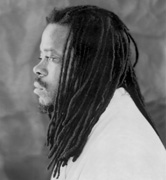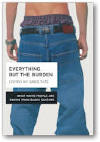A cultural critic for The Village Voice, GREG TATE is also the author of Flyboy in the Buttermilk and contributes regularly to U.S. national publications such as Rolling Stone, VIBE, and the New York Times. In addition, he helped found the Black Rock Coalition, produced two albums on his own label and composed a libretto that was performed at the Apollo Theater. He lives in New York City.
---Excerpt
"The postmodern pop-culture icon of the outlaw is complete and to be carried into the new millennium; Eminem does not seek to know pagan lore--he was born into it, has always spoken the language of it, has always danced to the music of it, has always dressed himself in the latest pagan wear, has never used this language, this music, or this apparel to disguise his true identity or to disguise his race, and he has never tried to dissociate himself from the source of his performance, the black male outlaw or outcast of hip-hop fame."
|
Despite the provocative book cover depicting the backside of a white male dressed in pseudo-gangsta attire, Everything But The Burden: What White People are Taking from Black Culture is not a gimmick. The anthology, edited by Greg Tate, arguably one of America’s best-known cultural theorists, is a collection of eighteen essays on the tenuous issue of race in post-Civil Rights America. Known for his no-bullshit candour, Tate looks at the issues of cultural appropriation and the struggles of achieving knowledge and respect for African-American culture in a landscape struggling with its own identity crisis. The book is a blend of academic/intellectual candour, humour, personal and serious observations about Black life in post - 9/11 America. The collection highlights the ways in which aspects of Black culture have been embraced, distorted, objectified, and celebrated – most often without the full recognition or understanding of the history behind the art. |
This is an important book, not just because it examines Eminem's popularity through a racial lens but also because it delves into subjects deeper and more diverse than the most common complaints regarding music and clothing.
Greg Tate spoke to us via telephone on a break from one of his other artistic projects.
How did the book project come about?
Greg Tate: The history of this project isn’t one that I proposed to Random House (publishing); they brought it to me. They were fascinated by – and I’m sure they weren’t alone – with this white rapper that was taken seriously by the Black community, and the way that he was embraced, and the way he was given his street cred by Dr. Dre in particular, that made him seem more than just a white artist who was just pimping a Black style. They became curious about the substance and where America is, racially. I think that they were more fascinated by the issue of white appropriation of black culture and the kind of success that it was generating in mainstream media outlets, like MTV and his record company. Also, they were interested in the response from the Black community. [The book] takes you on a lot of different side trips because race permeates every area of American culture. Because it is an anthology, it offers a look at the subject from many different viewpoints, perspectives and personal histories.
While it seems that cultural appropriation has been discussed in relation to specific issues, such as hair and hip hop, your book is the first to really delve into other areas, areas that not a lot of people have really thought about—no holds barred. Why do you think that there has been little discussion about these topics prior to this?
Greg Tate: I think that some of it is due to the complexity of the issue. It’s an issue that requires….Well, I think some Black people have a knee-jerk sensitivity to being consumed and appropriated. The root of our psychological response of being Black in white America – A majority- white country, a former slave-owning country, in a sense. But I think we’ve tried to define what freedom means to us. We have developed a very sophisticated language in ways of engaging in cultural appropriation, how it works, how it functions in our lives in the economic system, and how it affects us emotionally. It’s also a topic that I think up until the advent of Eminem, it wasn’t a topic that was in white people’s faces, in the way that it has been before. This book definitely exists because it is an infinite phenomenon.
In Carl Hancock’s essay, “Eminem: The New White Negro”, he writes, “The history of race in America means less to the New Generation of Pop music icons and their fans – socially, politically and psychologically – than the performance of class and outlaw status, it is because a race- inclusive product for the American cultural marketplace demands short-term memory.” Is Hancock implying that in order for new artists to become popular, their music has to be accessible to all by being what they think the culture wants them to be?
|
Greg Tate: I think the key issue there, in terms of when he refers to the whole question of outlaw status, is that people want pop icons that represent rebellion, and they’re not necessarily seeing the social sources of what people call rebellion. The fact that there has been a two-, three-, and four-hundred-year Black struggle for social justice creates the ground on which hip-hop can stand. That’s not necessarily there. What people can recognize is that Black people are stereotypically framed as being natural outlaws. They’re seen as outcasts, outsiders. People are fascinated and impressed that people from the margins can come up and are screaming and hollering to the foreground in hip-hop culture, and I think people are impressed by that. What (Hancock) is talking about is Eminem, Jay-Z, or Nas; people are moved that these figures are bad boy figures, not necessarily by the fact they are representatives of a culture that is at odds with the mainstream values and is politically oppressed. Politics is the race in pop (music) in order to pimp the rebellion quality of certain figures. |

author and cultural critic Greg Tate |
What do you see in the future for certain artists, like Dead Prez or Paris, who are doing hip-hop with a socially conscious message but are not getting the hype or monetary success of Jay-Z or Nas?
Greg Tate: I think what people have to remember is that the reason we know of progressive, socially conscious hip-hop is that the era of Public Enemy, KRS-One emerged, was really one in which hip-hop thrived on the radar of the mainstream. The mainstream was using a ten-foot pole to touch hip-hop, and people were still intimidated by hip-hop artists being in the corporate suites. A lot of things got signed, and a lot of things got pushed.
The corporate world knew that there was a lot of money to be made in hip-hop, so they didn’t really try to censor it or control it. A lot of things were able to come through that machine, critiquing materialism, capitalism, consumerism, and so forth. And that all changed with the advent of The Chronic (Dr. Dre), with West Coast gangsta rap, in terms of the kind of hip-hop the mainstream wanted to deal with.
For the first time, a formula, in terms of music, in terms of message, in terms of exaggerated sex and violence, was clearly something that mainstream media could relate to because that’s what they were currently selling in other forms through advertising and cable products. What also happened that once they had that formula, they were also able to change the definition of success within hip-hop. In 1988 terms, if you sold half a million records, that was considered a success. That was phenomenal, which is a definition of phenomenal success.
But once you go into pop music and mainstream, you have people who are selling seven, eight, and eleven million albums, and that becomes the definition of success. And anything that doesn’t even approach that is just marginal – not even worthy. When you factor in the political content, like a dead prez in particular, it really becomes something that is too hot to handle, especially in this post-9/11, oppressive climate that we have now in terms of dissent.
I read a review of the book in which the reviewer criticized the book's level of anger, saying that it was ‘too angry.’ What do you say to that?
Greg Tate: There are definitely white people in power who have problems being called out on their own racism. They are beneficiaries of racism, even if they don’t do it themselves. They are not necessarily looking at things in terms of how society works….I think a lot of people don’t want to see themselves as being beneficiaries of a vicious system. They like to imagine that if their hearts are pure, then others are pure, and everything is just and fair in their own world. People don’t want to see themselves implicated in a system of oppression as someone who is positioned and privileged by that system.
How do you personally deal with the backlash, the typical ‘you’re too sensitive’ response when delving into controversial issues?
Greg Tate: Your analysis is the response. We really have to come back and tell people, ‘you can’t tell me how to feel’. Even if you disagree, I own that. That’s the one thing we do own (laughs). In some ways, it’s why a lot of critical thinkers go to academia; there’s more room just for the discussion of ideas and for holding dissenting views. However, in terms of popular culture writing in America, it is difficult to find outlets for writing from dissenting viewpoints. You can count on your hands the number of places it appears, and when it does appear, you’re always amazed.
Is there any fear that this book might be dismissed as an example of reverse discrimination?
Greg Tate: When I look at the reviews that the book has gotten, I think that in some ways, in response to some of the negative reviews, one reviewer questioned why there weren’t more writers in the book, and then she suggested white writers she thought should be (in the book), and felt that the book should be more about whiteness, how white people feel about looking for themselves in Black culture or finding themselves through black culture. I think that there is an anxiety about Black people having an autonomous discussion, one that isn’t being consumed by the sole notion of white culture being a dominant culture. I think that’s one of the things the book does in a very subtle way.
It’s like black subjectivity, and it is very forward-looking; it assumes that Black people have very complex minds, and it recedes from that. We give you eighteen complex minds who have sat down and worked out their own equation of how race in America functions. And I think that it is an unfamiliar place for a lot of people and an uncomfortable place for people. They accept the subjectivity of a few black artists but not the growing body of Black artists.
Greg Tate’s latest book, “Midnight Lightning: Jimi Hendrix and the Black Experience" published by Lawrence Hill Books / Chicago Review Press, is available now at www.amazon.ca







Comments powered by CComment